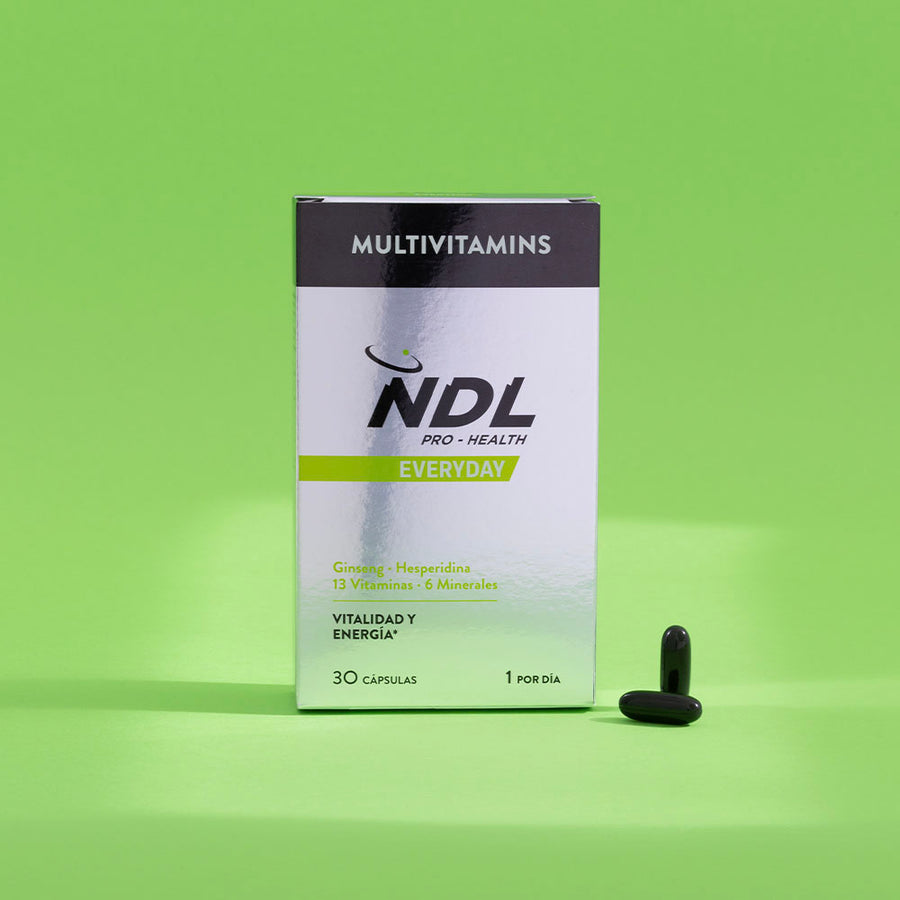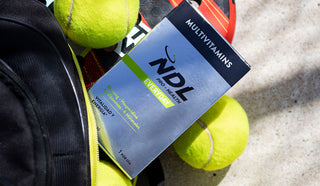Featured Products

Multivitamins and Minerals
See productIn the world of sport and physical activity, performance optimization is a priority for many athletes. Within this context, nutritional ergogenic aids have gained popularity as key tools to improve physical capacity, endurance and post-exercise recovery.
However, it is important to distinguish between ergogenic nutritional aids and general dietary supplements because, although both contribute to wellness and health, they have different purposes and applications.
This article explores these differences in depth, in addition to highlighting the importance of the most relevant vitamins and minerals for athletes, as well as the circumstances under which vitamin supplementation can be beneficial.
What are Ergogenic Nutritional Aids?
Nutritional ergogenic aids are substances or compounds, usually included in the diet or taken as supplements, that are used for the purpose of enhancing physical performance, athletic ability, strength, endurance, or recovery after exercise.
The term "ergogenic" comes from the Greek "ergon" (work) and "gen" (generate), and refers to something that generates or improves work capacity or performance. Carbohydrates, proteins and amino acids, creatine, caffeine, beta-alanine, are some types of nutritional ergogenic aids.
Now you may ask, what differentiates ergogenic nutritional aids from dietary supplements?
Nutritional ergogenic aids and dietary supplements are related concepts, but they are not exactly the same.
Dietary supplements are products designed to supplement the diet by providing nutrients that may be absent or not consumed in sufficient quantities in the daily diet. They include vitamins, minerals, herbs, amino acids, enzymes, and other compounds.
Their main purpose is to ensure adequate nutrition and prevent deficiencies. Although some dietary supplements may also have ergogenic effects (e.g. creatine or BCAAs), not all are intended to improve physical performance directly.
In summary, nutritional ergogenic aids are specifically aimed at improving physical and athletic performance, while dietary supplements have a broader focus on general health and prevention of nutritional deficiencies. Although they may overlap in some cases, their primary objectives and uses are different.
Vitamin and mineral supplements for sportsmen and sportswomen
Vitamin and mineral supplements can play an important role in optimizing sports performance, especially in situations where the diet does not fully cover nutritional needs due to high physical demands.
The following are the most important vitamins and minerals for athletes, as well as their key functions:
- Vitamin D: is crucial for bone health by facilitating the absorption of calcium and phosphorus. It also plays a role in muscle function, strength and the immune system.
- Vitamin C: a potent antioxidant that aids in tissue repair, collagen synthesis, iron absorption and protection against oxidative damage.
- B-Complex Vitamins (B1, B2, B3, B5, B6, B7, B9, B12): these vitamins are essential for energy metabolism, assisting in the conversion of carbohydrates, fats and proteins into energy. They are also important for red blood cell production and neurological function.
- Vitamin E: an antioxidant that protects cell membranes from oxidative damage and aids in muscle repair.
- Calcium: essential for bone health, muscle contraction and nerve transmission.
- Iron: necessary for the production of hemoglobin, which transports oxygen in the blood, and myoglobin, which stores oxygen in the muscles.
- Magnesium: involved in energy production, protein synthesis, muscle and nerve function.
- Zinc: necessary for immune function, protein synthesis and cellular repair.
- Potassium: essential for muscle contraction, fluid balance and nerve function.
- Sodium: regulates fluid balance, nerve function and muscle contraction.
The most important vitamin and mineral supplements for athletes include vitamin D, vitamin C, B vitamins, and vitamin E, as well as minerals such as calcium, iron, magnesium, zinc, potassium, and sodium.
These nutrients are essential for energy production, muscle function, bone health, immunity, and post-exercise recovery. Although a balanced diet can meet many of these needs, in some cases supplementation may be necessary to ensure optimal performance and prevent deficiencies.
NDL Pro-Health Multivitamins is a source of 13 vitamins and 6 minerals that helps reduce tiredness and fatigue thanks to its content of vitamins C, B2, B5, B6 and B12 and minerals such as magnesium and iron.
Vitamin D contributes to the maintenance of normal muscle function and vitamin C to the normal functioning of the immune system during and after intense physical exercise.
In addition, it is ideal for daily life and training of athletes, as it contributes to normal energy metabolism thanks to its iodine, thiamine, niacin and manganese content.
A formula that includes Ginseng extract, which gives you extra energy in your daily life, and Hesperidin, with anti-inflammatory and antioxidant properties.
How do vitamins help metabolic processes?
Vitamins play an essential role in the body's metabolic processes, acting primarily as cofactors or coenzymes in various biochemical reactions. Without these vitamins, many vital metabolic reactions could not be carried out efficiently.
Below, you will see how vitamins help in metabolic processes:
B-Complex Vitamins: B-complex vitamins are essential for the metabolism of carbohydrates, fats and proteins.
- B1 (Thiamine): acts as a coenzyme in the decarboxylation of pyruvate to acetyl-CoA, a key step in the production of energy (ATP) in the Krebs cycle.
- B2 (Riboflavin): part of the coenzymes FAD and FMN, which are crucial in the electron transport chain, where most of the ATP in the cell is generated.
- B3 (Niacin): is a component of the coenzymes NAD and NADP, which are involved in redox reactions essential for energy production and the synthesis of macromolecules.
- B5 (Pantothenic Acid): forms part of coenzyme A (CoA), essential for the synthesis and oxidation of fatty acids and the Krebs cycle.
- B6 (Pyridoxine): acts as a coenzyme in the transamination, deamination and decarboxylation of amino acids, essential in protein metabolism.
- B7 (Biotin): participates as a coenzyme in carboxylases, which are crucial in gluconeogenesis, fatty acid synthesis, and the metabolism of certain amino acids.
- B9 (Folic Acid): is essential for DNA synthesis and methylation, processes vital for cell division and the production of new tissues.
- B12 (Cobalamin): participates in the synthesis of nucleic acids and the formation of red blood cells, besides playing a role in the metabolism of fatty acids and amino acids.
Vitamin C (Ascorbic Acid): Vitamin C acts as a potent antioxidant, protecting cells from oxidative damage. In addition, it is a cofactor for enzymes involved in the biosynthesis of collagen, an important structural protein in connective tissues. It also participates in the synthesis of neurotransmitters and in the absorption of non-heme iron (of plant origin).
Vitamin A (Retinol): Vitamin A is crucial for vision, cell growth and differentiation. Retinol and its derivatives (such as retinoic acid) act as cofactors in gene transcription, regulating gene expression in processes such as cell development and immune response.
Vitamin D: Vitamin D is vital for the metabolism of calcium and phosphorus, promoting their absorption in the intestine and regulating their levels in the blood, which is essential for the formation and maintenance of healthy bones. It also plays a role in modulating the immune system.
Vitamin E (Tocopherols): Vitamin E is a fat-soluble antioxidant that protects cell membranes from oxidative damage by neutralizing free radicals. This is crucial in the protection of lipids in cell membranes and body fat stores.
Vitamin K: Vitamin K is essential for blood coagulation, as it is a cofactor in the carboxylation of specific proteins that allow the activation of coagulation factors. It also participates in bone metabolism by assisting in the carboxylation of osteocalcin, a protein that regulates bone mineralization.
Vitamins are fundamental to the body's metabolic processes, acting as cofactors and coenzymes that facilitate and regulate essential chemical reactions. Without these vitamins, the metabolism of nutrients such as carbohydrates, proteins and fats, as well as key processes such as energy production, DNA synthesis, and cellular repair, could not be carried out efficiently.

When to use vitamin supplementation for sports performance?
Vitamin supplementation for sports performance should be carefully considered, as each individual's needs may vary according to factors such as diet, type of sport, training intensity and health conditions.
Here's when it might be useful and appropriate to consider vitamin supplementation in the context of sports performance:
- Diagnosed Nutritional Deficiencies: if an athlete has been diagnosed with a specific vitamin deficiency, either through blood tests or by evaluation by a health professional.
- Restrictive or Inadequate Diet: in cases where an athlete's diet is insufficient to meet vitamin needs due to dietary restrictions (e.g., vegetarians or vegans), loss of appetite, or imbalances in food intake.
- High Intensity or Volume Training: during periods of intense training, where oxidative stress and body wear and tear are high, the demands for antioxidant vitamins (such as vitamins C and E) and B complex vitamins may increase.
- Extreme Environmental Conditions: in extreme weather conditions, such as intense cold or high heat, where vitamin needs may increase.
- Fatigue and Injury Prevention: to prevent chronic fatigue or injuries related to vitamin deficiencies that affect muscle performance and recovery.
- Competition Preparation: prior to major competitions, some athletes may opt for targeted supplementation to ensure that their vitamin levels are optimized.
- Aging and Sports Performance: with aging, the absorption of some vitamins (such as B12) decreases, and supplementation may be necessary to maintain sports performance.
Vitamin supplementation for sports performance can be beneficial in specific situations such as diagnosed deficiencies, restrictive diets, intense training, or extreme environmental conditions. However, it is essential that supplementation be personalized and supervised by a professional to avoid excesses and ensure its effectiveness.

From the NDL Pro-Health team we will provide you with tips to maintain a healthy lifestyle. Sharing knowledge and product recommendations to offer optimal solutions for your daily routine, for your workouts and subsequent recovery, all with the goal of helping you achieve physical and mental wellness.

















